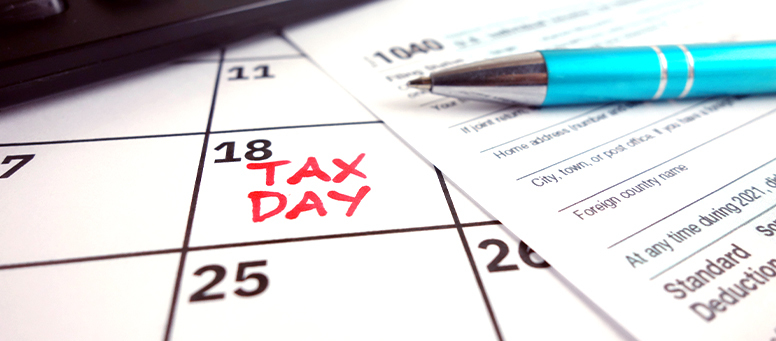Doing Your Taxes During Debt Resolution
Even while you’re not going through a debt resolution program, tax season can be a bit stressful. Add what seems like further complexity with Resolution Offers, and it could seem even more overwhelming. But it really doesn’t have to be!
Taking some key steps to ensure you’re all good to go when it comes time to file and pay your taxes can give some major relief and allow you to keep moving forward on that path to a debt-free life!
Read on to learn 4 important general tax tips, and what you should know when it comes to debt resolution and taxes.
- Decide If You Need Help
- Determine If You Want to Take the Standard Deduction or Itemize
- Organize Your Records
- Pay Your Taxes On Time
General Tax Tips
1. Decide If You Need Help
If your income is pretty straightforward and you haven’t made any big life changes (i.e. marriage, a new baby, or a home purchase), your taxes might be simple enough for you to do on your own. But if you have made a big change, you’re active in investing, you have multiple sources of income, or you make frequent charitable donations, it might be worth enlisting the help of a professional.
If, on the other hand, you feel comfortable filing on your own, look into whether you qualify to file your taxes for free with an IRS Free File provider. You might also consider using a software like TurboTax. If your taxes are simple enough, you can access this software for free before April.
2. Determine If You Want to Take the Standard Deduction or Itemize

In many instances, taking the standard deduction will save you money, but not always. For some people who have significant business expenses, medical expenses, student loan interest, or other deductible expenditures, it could be worth itemizing these deductions and seeing if you could get more money back.
If you think your qualified expenses might total more than the current standard deduction, you might want to look over the “Deductions for Individuals” section on the IRS website or talk to a tax professional to help you make this decision.
3. Organize Your Records
It could be smart to go over a tax checklist to make sure you’ve collected everything you need come April 18th. Make sure you’re holding onto W-2s, 1099s, and any other tax forms you receive in the mail. If you receive income from other sources (rental, side hustles, etc.), you should have the details and documentation for this as well.
Those who’ve decided to itemize their deductions should start collecting all of the receipts related to those deductions — for example, if you had significant medical expenses in the past year, gather together the invoices for these costs.
If you invest your money in anything other than a retirement account, you’ll want to collect the tax documents related to these investments or trades (your brokerage account should provide these). In some cases, you may owe money on gains, but if you saw capital losses, this could actually reduce your taxes.
4. Pay Your Taxes On Time
If you know you’re not going to have time to gather everything you need and submit your tax return by the April 18th deadline, you can file for an extension. This moves the deadline to submit your return to October 16th. However, this does not extend the deadline to actually pay your taxes. They’re still due on April 18th and if you miss this deadline, you could be subject to penalties and interest.
Debt Resolution and Taxes
Whether you have to pay taxes on one or more of your Resolution Offers this year will depend on a few things:
- How much you saved on the debt
- Whether the Resolution Offer was completely paid off last year
- Whether you’re insolvent
The IRS refers to the difference between the amount of the original debt and the offer amount — essentially how much you saved on the debt — as “canceled debt.” If this difference exceeds $600, then your creditor should have sent you a 1099-C notice and you will need to report this as “other income” on your tax return.
Sometimes creditors forget to send this, which means the IRS is unaware of the canceled debt. However, you’re still technically responsible for paying this canceled debt income tax. If you were selected for an audit in the future, the IRS could discover this canceled debt. Ask a tax advisor for guidance if you haven’t received a 1099-C from one of your creditors.
Another important consideration is that you’d only owe taxes on a Resolution Offer if it was completely paid off the previous year. In other words, if you accepted an offer last year, but you’re still making payments towards it this year, you don’t have to worry about taxes on that Resolution Offer this year.
And finally, if your total debt exceeds your total assets, you’re considered “insolvent.” If this is the case, the canceled debt you’d otherwise owe is excluded from taxation up to the amount you’re insolvent.
Final Words

While no one’s exactly doing a happy dance over tax season, there are plenty of ways to keep this time of year as calm as any other. Get prepared, do a little homework, and make sure you get help if you need it.
And of course, it’s important to understand taxes as they relate to debt resolution, but in the end, it’s like any other benefit we pay taxes on. If someone at Target offered you a “50% Off” coupon would you refuse it because you’d still be paying sales tax?
Depending on your situation and the updated terms you have with your creditors, taxes can be a normal part of the Beyond Finance journey and just one more step on your path to financial freedom.
*This blog post is designed to be educational and should not substitute professional advice from a tax accountant. For specific guidance on how to move forward on your tax return and pay your taxes, consult a CPA.
